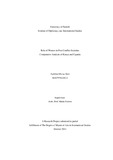| dc.description.abstract | The study sought to find out the role of women both during the peace process and also in the rehabilitation and reintegration phase. Pre-conflict and post-conflict phases share marked parallels. The requisite measures are often similar, since peace building and conflict prevention are essential before and after a conflict.
Women can play a significant role in decision-making functions through their full participation in conflict settlement and peace processes. Women can also act in this phase as negotiators and mediators to encourage dialogue between the parties. During the reconstruction of the justice and administrative systems qualified women can help in the formulation of laws and regulations to ensure gender equality in public life and fair access to economic resources (e.g. land and property rights).
However, despite their active role in promoting peace, women tend to fade into the background when official peace negotiations begin and the consolidation of peace and rebuilding of the economy becomes a formal exercise.
Women constitute an indispensable force in rebuilding societies emerging from conflict. But women‘s valuable contributions notwithstanding, much could be done to support them. However, as has also been demonstrated, there is no universal answer to the question about how best to support women in societies emerging from conflict. | en_US |

